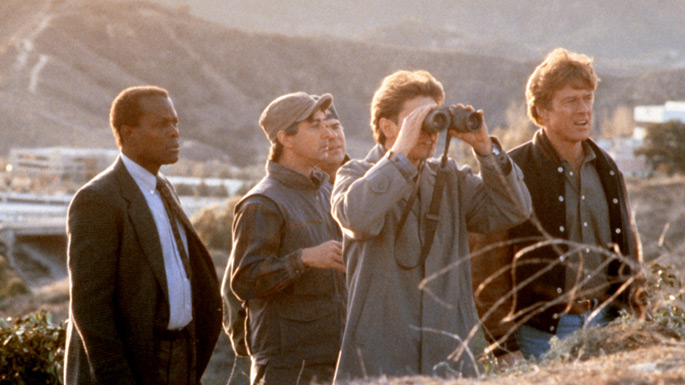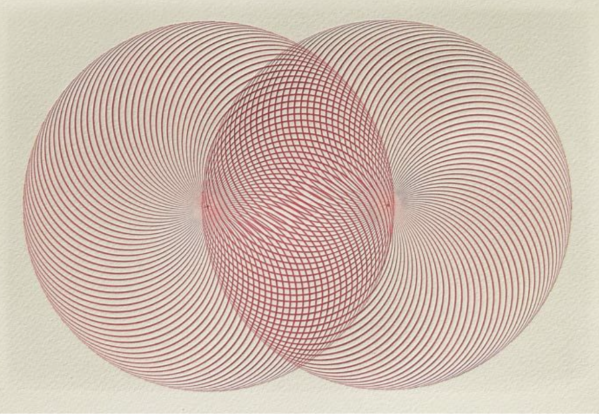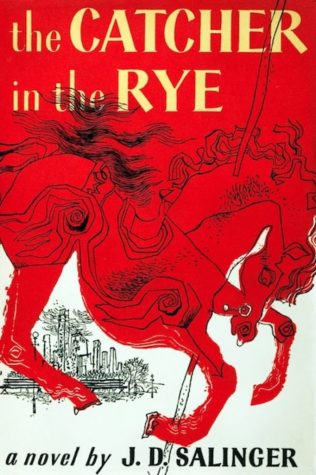Classic Review: The Prescient Spy Antics of “Sneakers”
I watched “Sneakers” with my parents when I was about 11 or 12 years old. I absolutely loved it: the action sequences, the humorous tone, the clever tricks. The movie, which came out in 1992, immediately shot to the top of my favorites list. Although “Sneakers” has been shaken from the number one spot, it’s remained on my top ten list ever since.
This spring break, I decided to rewatch “Sneakers” to answer the question: Does my childhood favorite movie stand the test of time?
The answer: Yes, it absolutely does.
“Sneakers” opens in a flashback to 1969. Two college students, Martin Brice (Robert Redford) and Cosmo (Ben Kingsley), are using their hacking skills to play “pranks.” Despite their humorous attitude, these pranks — such as transferring every cent in Richard Nixon’s bank account to the National Association to Legalize Marijuana — are extremely illegal. The police catch Cosmo, but Martin avoids the cops by sheer dumb luck.
Fast-forward to the present day (1992, that is). Martin Brice has rebranded himself as Martin Bishop. He’s built a new life for himself as a security specialist: someone who breaks into banks so that those banks can improve their defenses. Martin leads an all-star team of hackers and sneakers.
Crease (Sidney Poitier) is a former CIA agent who’s never quite lost his sense of paranoia — or his sense of national duty. Crease’s foil is “Mother” (Dan Aykroyd) who will ramble about conspiracy theories to anyone who will listen. There’s also Carl (River Phoenix), a young hacker more interested in girls than in money, and Liz (Mary McDonnell), an ex-girlfriend of Martin who finds herself back in the madness. Rounding out the team is “Whistler” (David Strathairn). Whistler is blind, but his keen sense of hearing makes him invaluable to any mission.
However, no matter how well this team does, Martin’s past still comes back to haunt him. His college crimes become blackmail material, and the team gets embroiled in a conspiracy of epic proportions, involving the Russians, the NSA and other spooks.
The movie came out almost 30 years ago, and I still can’t bring myself to spoil it for you. Like every spy movie, “Sneakers” has its fair share of twists and crosses, and like every heist movie, it has its own uniquely convoluted plans. It’d be wrong to ruin those moments, even if we’re well after the two-week spoiler grace period.
Calling “Sneakers” a simple spy movie or a heist movie seems like an injustice. It’s wildly funny, which is both due to its writing and its cast. The wisecracks that the characters bounce off one another are not only wittily worded but beautifully executed. Some of the funniest moments in this movie focus on the tension between Mother, who believes every conspiracy theory, and Crease, who believes none of them. Aykroyd’s Mother is lovably petulant in sharing his conspiracies, while Poitier’s Crease is amusingly annoyed by his antics; together, they are on fire. Comedy also adds in some more subtle touches, such as Whistler reading a Playboy magazine written in Braille.
“Sneakers” also has its moments of clarity, where a fun, silly spy movie hits on a deep vein of truth. In a way, the film seems to be ahead of its time. For instance, throughout the movie, there’s a direct implication that the NSA is spying on American citizens. Everyone on the sneakers team believes this, and even the NSA agents don’t deny it. Edward Snowden confirmed this implication just over 20 years later.
This isn’t the only time that the movie looks toward the future. Near the end of “Sneakers,” the film’s ultimate antagonist tries to explain how technology has transformed the way we think of the world. As he puts it, “It’s not about who’s got the most bullets. It’s about who controls the information.” These words rang true when the movie premiered, but today they seem more relevant than ever. Our world is run by data.
Sure, there are times that “Sneakers” shows its age. Characters laugh at the concept of meeting a date online, which they call “compu-dating” — and in 1992, that concept was laughable. (Today, it’s one of the most popular ways that couples meet.) The campy soundtrack, characterized by melodramatic piano music, also dates this movie in the ’90s.
However, these are small complaints that shouldn’t negate how well “Sneakers” stands the test of time. The movie hasn’t lost its excitement or its sense of humor — it’s just as fun to watch now as it was in the past. Amazingly, it also hasn’t lost its relevance. For better or for worse, hackers and spies are just as important in 2020 as they were in 1992. The technology they use may have changed, but the reasons have not.
“Sneakers” holds up, and it’s cemented its place on my favorites list.

Erica Weidner is a junior at Fordham College at Rose Hill, majoring in English and double minoring in political science and philosophy, and for the last...















































































































































































































